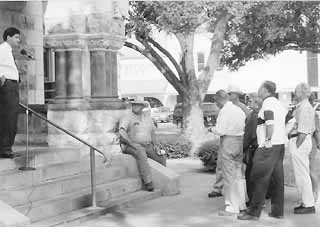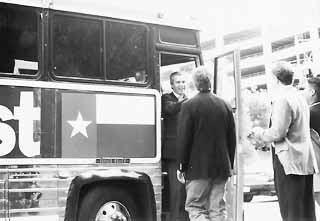Land Mine
By Kayte VanScoy, Fri., Oct. 30, 1998
|
|
I said a hip hop the hippie to the hippie the hip hip hop and ya don't stop..." Richard Raymond, the Democratic candidate for state land commissioner, is delivering his rendition of "Rapper's Delight" from the back of a rattletrap school bus on the way to his next campaign stop in Bay City. Raymond, 38, a three-term state representative from Benevides, is feeling laid-back because the weather is cooperating with his campaign for a change. After a sweltering summer spent tooling around the backroads of Texas in his un-airconditioned campaign bus, Raymond is just grateful for October's seasonal shift.
His Republican opponent, David Dewhurst, 52, the millionaire president of the Houston-based oil and gas co-generation corporation Falcon Seaboard, also spent the summer and fall on a campaign bus tour, but the contrast between his mode of transport and Raymond's is as stark as the differences in the two candidate's campaigns. Raymond purchased his used school bus for $5,000, while Dewhurst spent the summer on what he termed a "Dirty Boots" tour of the state from the plush seats of a shiny, silver charter bus which was rumored to have a bathroom, kitchen facilities, and an on-board Jacuzzi. The Chronicle cannot confirm Dewhurst's Dirty Boots amenities, however, because his campaign has refused access for even a two-minute interview with the candidate.
But even standing on the street watching Dewhurst's bus pull into Wooldridge Park at Guadalupe and 10th streets on Monday afternoon, it was immediately apparent that his campaign was bursting at the seams with dough. As the bus pulled in, it piped "All Hail to the Red, White, and Blue" onto the street as Dewhurst descended the steps. The whole atmosphere seemed more like the welcome for a presidential candidate than for the obscure office of land commissioner.
In fact, lavish production numbers seem to be Dewhurst's primary campaign strategy, and it isn't likely he had to get his boots very dirty to pull them off. His campaign is flush with over $4.5 million dollars, $4 million of which he loaned to himself. Raymond's campaign, by contrast, has raised just under $1 million. That's a lot to spend running for an office that most Texans do not even know exists.
But the land commissioner is one of the most powerful and important of the state's constitutionally created offices, overseeing the administration of all the state's land, and the management of the billions of dollars which it generates for the state's Permanent School Fund, Permanent University Fund, and veterans programs.
Borrowing From Perot
Dewhurst's campaign rhetoric is kind of Perot-esque, harping on his natural qualifications for the position, based on his demonstrated ability to make money for himself, which he wants voters to assume will automatically transfer to him making a lot of money for the state's schools and veterans. Unlike Ross Perot, however, Dewhurst's ideas appear to stop at the boardroom door. In his campaign commercials and stump speeches focused on answering the question, "What Does the Land Commissioner Do?" Dewhurst appears to be schooling himself on what exactly this job will entail.
|
|
Raymond, on the other hand, has spent the past decade in public service, including two years as executive assistant to Land Commissioner Garry Mauro, and six on the floor of the state House of Represent-atives. Raymond points proudly to his work on the Texas Tomorrow Fund, which created the constitutionally protected opportunity for Texans to pay for their children's future college education at current prices. And as a member of the House Appropriations Committee, Raymond also takes issue with Dewhurst's contention that a CEO would make a better money manager for the state. "It's one thing to understand how to manage a $10 million budget for a company," Raymond says, "but it's another thing to manage an $80 billion dollar state budget."
When Raymond's yellow school bus pulls into the town square in La Grange, there is very little fanfare and only 15 people milling around. One white-hat-wearing rancher sidles up to Raymond following his stump speech and begs, "You've got to talk about those vouchers, man. They're going to ruin our schools." Indeed, the Republican proposal to allow parents to use a voucher discounting thousands of dollars off of their annual property tax if they choose to send their children to private school is a hot topic in campaigns across the nation.
Raymond points out that the land commissioner can not decide on policy changes that require legislation, like school vouchers, but he is hopeful that his lifelong privilege as a former representative to lobby from the House floor will help. "Maybe I can't push the button anymore, but I darn sure can work the floor," he says. If elected, Raymond's campaign promises would have him working the floor often. He has proposed a Veteran's Teacher Corps which would train military vets to teach in schools, and a constitutional amendment to guarantee that all Texas beaches remain open to the public. Texas is currently one of only two states with this policy.
Dewhurst, by contrast, is concerned with private property rights. From the stump, he preaches moderating environmental regulation to ensure the protection of private property. He also points out that since the land office makes most of its money from oil and gas, his experience in the oil and gas industry would be key to generating money for the state.
But Raymond worries that it is precisely those ties to that industry which could create disastrous conflicts of interest, and he points out that while Dewhurst is paying back the $4 million in loans which have financed his campaign, he would simultaneously be making policy decisions which affect his own business fortune. (Dewhurst's personal wealth is rumored to be $200 million.)
Ignoring Rule # 2
Rule #2 on the posted regulations for riding on Raymond's school bus is "Be Courteous," but that rule doesn't seem to have made it out of the bus. In fact, both sides have waged a mud-slinging war which has detracted from the important issues of the campaign. Raymond has harped on Dewhurst's still unexplained role as a CIA operative in Bolivia during a bloody CIA-sponsored coup of the Bolivian government. Dewhurst has countered with the accusation that Raymond lives outside of his district and has misused state travel vouchers. Raymond came back with a 300-page tome documenting charges of embezzlement leveled at Dewhurst by his former business partners, with whom he went bankrupt in a 1982 oil well venture called Trans-Gulf Supply. On top of that, Dewhurst was accused by Jerry Patterson, one of his Republican opponents in the primary, of trying to bribe him out of the race. When law enforcement said that Patterson would have to wear a wire to bust Dewhurst, Patterson backed off of prosecution.
The biggest scandal of this campaign, however, is Dewhurst's refusal to debate Raymond, or to submit to any meaningful interviews in the press. A quick perusal of articles from across the state quickly show that Dewhurst's campaign manager, Mark Sanders, a well-known GOP strategist, has done virtually all of Dewhurst's talking for him. Repeated phone calls for this story were politely routed to Sanders, who eventually gave his final word, "That's it, no access," when this reporter attended Dewhurst's campaign stop in Austin on Monday. The fact that Dewhurst is currently ahead in the polls -- by a slim 5% or a more comfortable 12% depending on your sources -- can only be attributed to his one campaign promise: A demonstrated ability to make money and spend it.
Got something to say on the subject? Send a letter to the editor.








